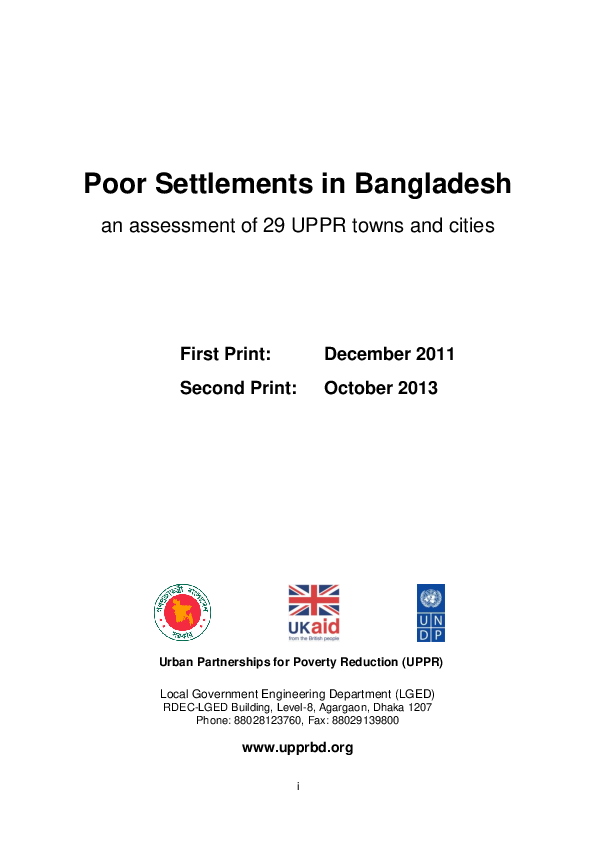Resources
Poor Settlements in Bangladesh: An assessment of 29 UPPR towns and cities
Posted on January 01, 2013

Since its inception in 2008, Urban Partnerships for Poverty Reduction (UPPR) has grown to be Bangladesh’s principal urban poverty reduction initiative. Currently active in 23 and soon 30 major towns and cities, it provides services to more than 3.5 million people living in some of the country’s most challenged communities and aims to secure sustained improvements in the livelihoods and living conditions of the urban poor. This is an ambitious and sizeable undertaking. The Project’s annual budget is in excess of USD 20 million and has some 450 staff working in communities, at the town level and in its head office in Dhaka. Ensuring first rate delivery lies at the heart of UPPR’s operations. This requires first rate systems and first rate knowledge, and therefore, first rate data. The pursuit of timely, relevant and reliable information has been a priority for UPPR’s management, which has therefore designed a comprehensive framework of survey instruments. The Settlement and Vacant Land Mapping (SLM) exercise, on which this report is based, is just one of these methods. The SLM process empowered local communities by engaging them in mapping poor settlements, under the guidance of UPPR staff and its lead local partner, the Centre for Urban Studies. The dataset, covering 29 towns and cities, is a robust and flexible information resource. The results offer a comprehensive snap-shot of living conditions and the pattern of deprivation in each poor settlement that can also be summarized at the ward and town levels. This report provides a major research output, offering a welfare profile for poor settlements overall and by investigating the underlying relationships at work through a series of town comparisons. Counterpart individual town reports and ward-level atlases have also been prepared. These will prove vital in facilitating better planning and use of resources, and the identification of needs by communities themselves, by project staff and by Mayors and municipal policymakers. Indeed, the policy implications of these reports and mapping tools are considerable. They provide a solid evidential base to inform national decision-making and to challenge commonly held assumptions, and hence, build a new commitment to urban regeneration, and where necessary, the consensual resettlement of slum dwellers. Equally, local decision-makers might better understand the plight and service needs of the poor and recognize their rights as residents of cities and towns.In the closing years of the 16th century the English philosopher, Francis Bacon wrote that “Knowledge is power”. Some 400 years later, Former General Secretary of the United Nations, Kofi Annan, noted in an address to the General Assembly that “Knowledge is power and information is liberating”. Through this, and a series of other informational initiatives, UPPR is seeking to permanently empower and liberate Bangladesh’s challenged urban communities.